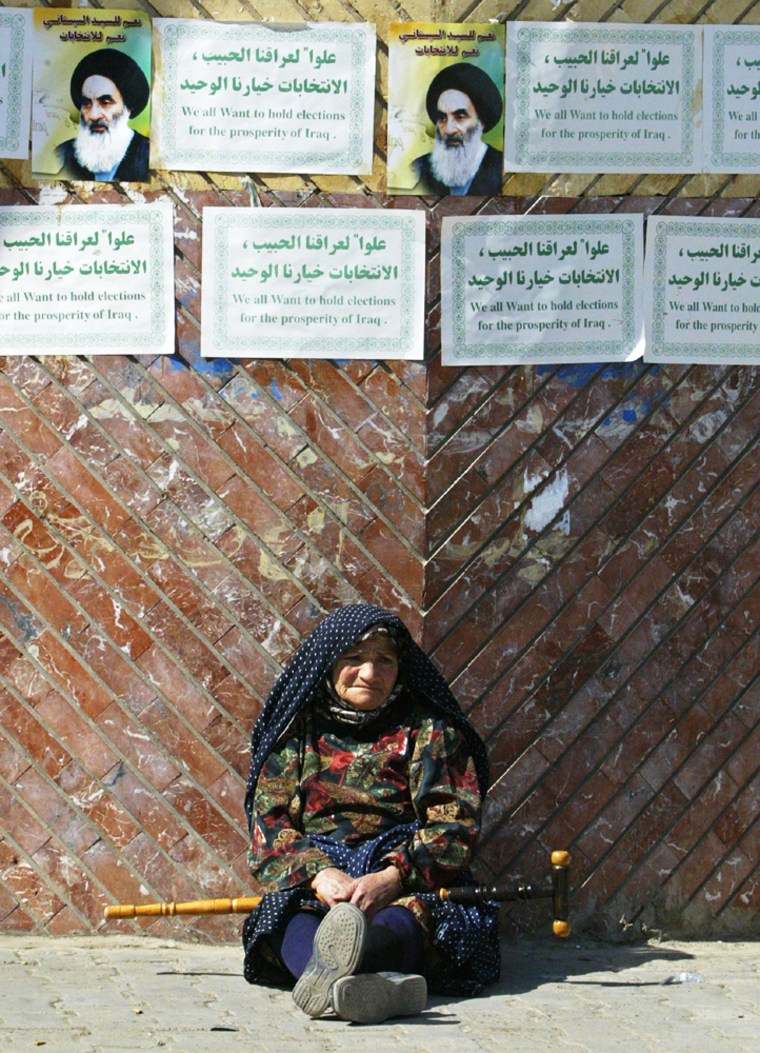Iraq’s most prominent Shiite Muslim cleric on Thursday called for elections by the end of the year, signaling that he would accept an interim government but offering a strict time-frame after the United States hands over power.
The influential Grand Ayatollah Ali al-Husseini al-Sistani also demanded “clear guarantees, such as a Security Council resolution, regarding the date so that Iraqis will be sure that there is no more postponement and prolonging.”
The statement, issued by the elderly cleric’s office in Najaf, was his first public comment on the issue since U.N. Secretary Kofi Annan ruled out elections by June 30 — when the United States plans to return sovereignty to the Iraqis.
Al-Sistani said that although the United Nations had decided an election wasn’t feasible before the U.S.-imposed deadline, the world body’s suggestion that the vote could be held by the end of the year “is of great significance.”
The United States had argued that elections could not be held before the transfer of power because of the absence of electoral laws and voter rolls.
“The U.N. estimates somewhere between a year and 15 months. It might be that it could be sped up a little bit,” L. Paul Bremer, the U.S. administrator for Iraq, said last week in an interview with the Dubai-based Al Arabiya television station. “But there are real important technical problems as to why elections are not possible.”
Al-Sistani said the “unelected government” that will take power June 30 must have a “limited and clear mandate” to remain in office “for a few months only.”
Bush administration eager to hand over power
The Bush administration, facing continued violence against U.S. forces and eager to end the formal occupation ahead of November presidential elections, has said the June 30 deadline for the transfer of power and the end of the occupation cannot be changed.
U.S. officials say they are anxious for the Iraqis to recommend ways to form a transitional government now that two U.S. blueprints have been rejected.
Al-Sistani’s statement was issued following a meeting with a delegation of Shiite members of the Iraqi Governing Council. After the meeting, delegation member Mouwafak al-Rubaie told reporters that “we support al-Sistani’s statement in the smallest details.”
The United States had planned to hand over power June 30 to a government chosen by a transitional legislature, whose members would be selected in regional caucuses. That plan was shot down after al-Sistani demanded the legislature be elected.
Last year, al-Sistani’s demands for elected delegates to draft a new constitution, rather than those appointed by the U.S.-led coalition and the Iraqis, forced Washington to revise a seven-stage plan that would have established a sovereign government in 2005.
The United Nations agreed with Washington that elections could not be organized by June 30 and it urged the Iraqis to come up with a way to choose an administration to run the country until a vote could be held.
In his statement, al-Sistani noted that “there is a growing concern” whether the Iraqis, the Americans and the United Nations “can during the remaining period reach a mechanism that enjoys the broadest support of the Iraqi people.”
Al-Sistani said Iraq was now facing political factionalism that he had “tried to overcome by calling for direct elections.”
